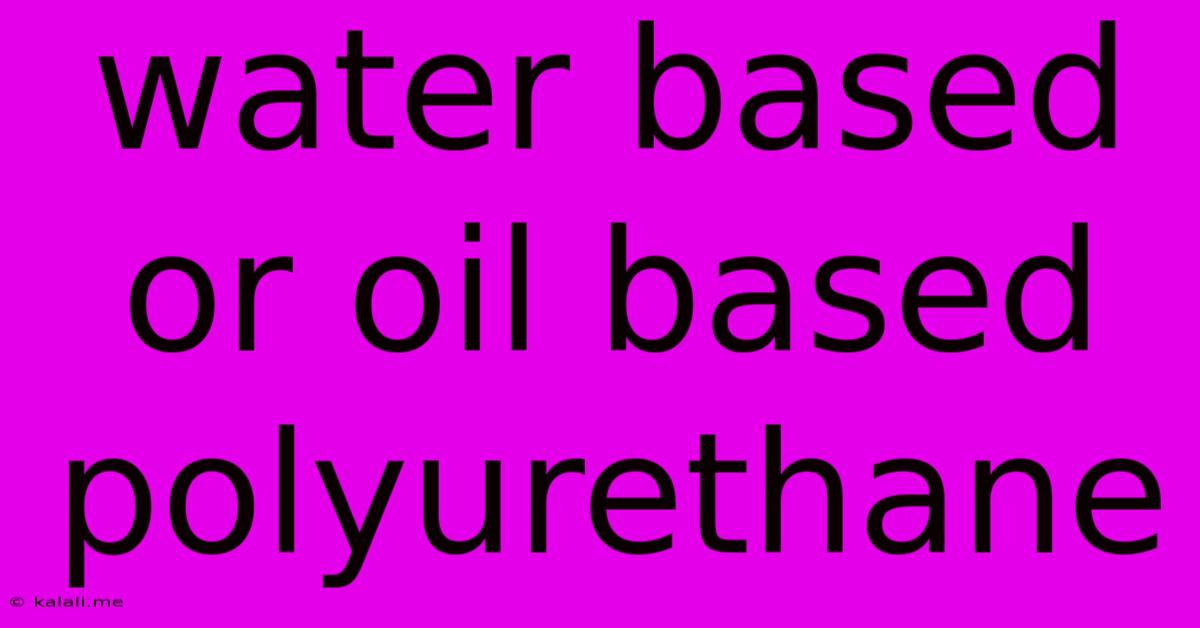Water Based Or Oil Based Polyurethane
Kalali
Jun 04, 2025 · 3 min read

Table of Contents
Water-Based vs. Oil-Based Polyurethane: Choosing the Right Finish for Your Project
Choosing between water-based and oil-based polyurethane can feel overwhelming. Both offer durable finishes, but their application, drying time, and overall characteristics differ significantly. This guide breaks down the key differences to help you select the best polyurethane for your specific project. Understanding these nuances will ensure you achieve a professional-looking and long-lasting finish on your wood.
What is Polyurethane? Polyurethane is a versatile protective coating used to seal and protect wood surfaces, adding durability and enhancing their natural beauty. It's available in two main types: water-based and oil-based. Both provide a protective barrier against scratches, water damage, and UV rays, but their properties and application methods vary considerably.
Water-Based Polyurethane: The Eco-Friendly Choice
Water-based polyurethane has gained popularity due to its low VOC (Volatile Organic Compound) content, making it a more environmentally friendly option compared to its oil-based counterpart. It's easier to clean up with soap and water, reducing the need for harsh solvents.
Pros of Water-Based Polyurethane:
- Low odor: Water-based polyurethane has a significantly milder odor than oil-based, making it ideal for indoor projects and those sensitive to strong fumes.
- Faster drying time: Generally dries faster than oil-based polyurethane, allowing for quicker project completion.
- Easy cleanup: Soap and water are sufficient for cleanup, simplifying the process.
- Lower VOCs: Environmentally friendly with reduced emissions.
- Good for multiple coats: Allows for easier layering without significant build-up.
Cons of Water-Based Polyurethane:
- Less durable (in some cases): While modern water-based polyurethanes are incredibly durable, they might not be as robust as oil-based options for high-traffic areas or outdoor applications.
- Can raise the grain: May require sanding between coats to achieve a smooth finish.
- Susceptible to water damage (in certain conditions): While water-resistant, prolonged exposure to moisture can be detrimental in some cases.
Oil-Based Polyurethane: The Traditional Workhorse
Oil-based polyurethane has been a staple in woodworking for decades, known for its exceptional durability and deep, rich finish. However, it comes with some drawbacks compared to its water-based counterpart.
Pros of Oil-Based Polyurethane:
- Superior durability: Offers superior scratch and water resistance, making it ideal for furniture and high-traffic areas.
- Self-leveling: Tends to self-level more effectively, resulting in a smoother finish.
- Better penetration: Penetrates the wood more deeply, enhancing its protection.
Cons of Oil-Based Polyurethane:
- Strong odor: Has a strong, pungent odor that requires good ventilation during application and drying.
- Slower drying time: Takes significantly longer to dry compared to water-based polyurethane.
- Difficult cleanup: Requires mineral spirits or paint thinner for cleanup, adding complexity and environmental concerns.
- Higher VOCs: Contains higher levels of VOCs, contributing to air pollution.
Choosing the Right Polyurethane: A Practical Guide
The best choice depends heavily on your project's requirements and your personal preferences.
- For high-traffic furniture or outdoor projects: Oil-based polyurethane offers superior durability and protection against harsh conditions.
- For indoor projects with less wear and tear: Water-based polyurethane is a great eco-friendly alternative with faster drying time and easier cleanup.
- For projects requiring a smooth, self-leveling finish: Oil-based polyurethane might be preferred.
- For projects where odor is a major concern: Water-based polyurethane’s low odor is a significant advantage.
Ultimately, both water-based and oil-based polyurethanes can deliver excellent results. Carefully consider the pros and cons of each type, and select the one that best fits your project's needs and your environmental priorities. Remember to always follow the manufacturer's instructions for proper application and drying time.
Latest Posts
Latest Posts
-
Conditional Filter On Edit Page Salesforce
Jun 06, 2025
-
How Small Can A Hamster Cage Be
Jun 06, 2025
-
Stardew Valley What Happens If You Skip Cutscenes
Jun 06, 2025
-
What Is A Degree Date In High School
Jun 06, 2025
-
Dnd Bag Of Holding In A Bag Of Holding
Jun 06, 2025
Related Post
Thank you for visiting our website which covers about Water Based Or Oil Based Polyurethane . We hope the information provided has been useful to you. Feel free to contact us if you have any questions or need further assistance. See you next time and don't miss to bookmark.